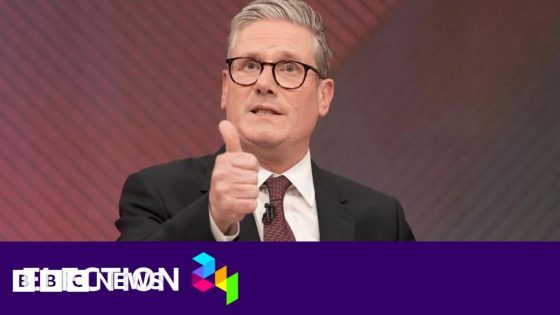Labour’s leader Sir Keir Starmer has said wealth creation will be the “number one priority” in his party’s general election manifesto.
The document setting out what Labour would do in government if Sir Keir becomes prime minister after 4 July will be unveiled later on Thursday.
Sir Keir has stressed there will be “no surprises” on tax, as he seeks to defuse Tory attacks that his party would put them up.
“I think people are taxed too much already. What I want to do, my central mission, is to grow the economy,” he said in a Sky News election special.
Only by growing the economy can Labour generate the funds needed for public services, he argued.
The manifesto launch will be a chance for Labour to showcase key policies it had already announced before the election campaign began.
These include setting up a new state-owned energy investment and generation company, hiring more police officers and renationalising nearly all passenger rail.
But the party could also offer more detail in other priority areas such as planning reform, which it has put front and centre of its economic plans.
Ahead of the launch, Sir Keir said wealth creation was “our number one priority” and “growth is our core business”.
“If we could grow the economy at anything like the level the last Labour government did, that’s an extra £70bn worth of investment for our public services,” he added.
He argued that “billions upon billions in projects” could be unlocked through changes to investment rules and the planning regime, but were currently “held up by the blockers of aspiration”.
Labour’s manifesto was signed off at a party meeting last week but has failed to win the support of Unite, its biggest trade union backer, which argues the party’s scaled-back plans to improve workers’ rights do not go far enough.
The package, first unveiled in 2021, would scrap qualifying times for parental leave and sick pay rights when employees start a new job, and boost flexible working rights where “reasonably feasible”.
But notably, a pledge to introduce collective wage bargaining “across the economy” has been replaced with a plan to “start by” introducing a fair pay agreement in the adult social care sector, before a potential roll-out in other areas.
Other policies expected to feature in the manifesto include:
- introducing free breakfast clubs in primary schools in England
- banning under-16s in England from buying high-caffeine energy drinks
- £1.6bn to pay for more appointments in NHS hospitals, new CT scanners and extra dentist appointments.
Labour has long argued that growth is the only responsible way to generate extra funding for public services and says it wants to make the UK the fastest growing economy in the G7 group of rich nations if it wins power.
Arguing that it will inherit a difficult financial position if it enters office, it has made only a handful of additional spending commitments since the election was called three weeks ago.
These include £140m to convert 3,300 classrooms into nurseries, paid for by introducing VAT on private school fees, and £320m for repairing potholes, financed by deferring a new bypass from the A27 in Sussex.
Sir Keir made the unusual move of invoking his predecessor to attack Tory election pledges to cut taxes, accusing them of a “Jeremy Corbyn-style manifesto” where “none of it is costed”.
Labour has ruled out increasing rates of income tax, National Insurance or VAT, which in the manifesto will be presented as a “tax lock” for voters.
It has also ruled out increasing the main rate of corporation tax, which companies pay on their profits, in an attempt to burnish its pro-business credentials.
But it has not made the same commitment for capital gains tax, charged on profits from selling assets, saying instead its manifesto plans do not “require” a hike.
If you are expecting surprises from Labour, well – don’t.
It does not look like there will be any. This will be a manifesto seeking to reassure, rather than reveal.
To pull together, the party hopes, the “missions” for government Sir Keir has been fleshing out for the last 18 months centred on the economy, education, crime, health and energy.
Labour insist they amount to the foundations for what it calls a “decade of national renewal”.
The Conservatives, who have announced a blitz of new policies in the last few weeks, claim Labour’s plans are empty.
As the Tories seek to draw a dividing line with Labour on tax cuts, Sir Keir will counter that he rejects the instinct to tax and spend. Instead, growing the economy is his central objective.
Delivering that, though, could well prove rather more tricky.
The manifesto is around 23,000 words long, we are told – that is shorter than their doomed offering in 2019.
And if you are not sure what Sir Keir looks like if you start reading it, you will by the end – there are 34 pictures of him within it.
Source Agencies

